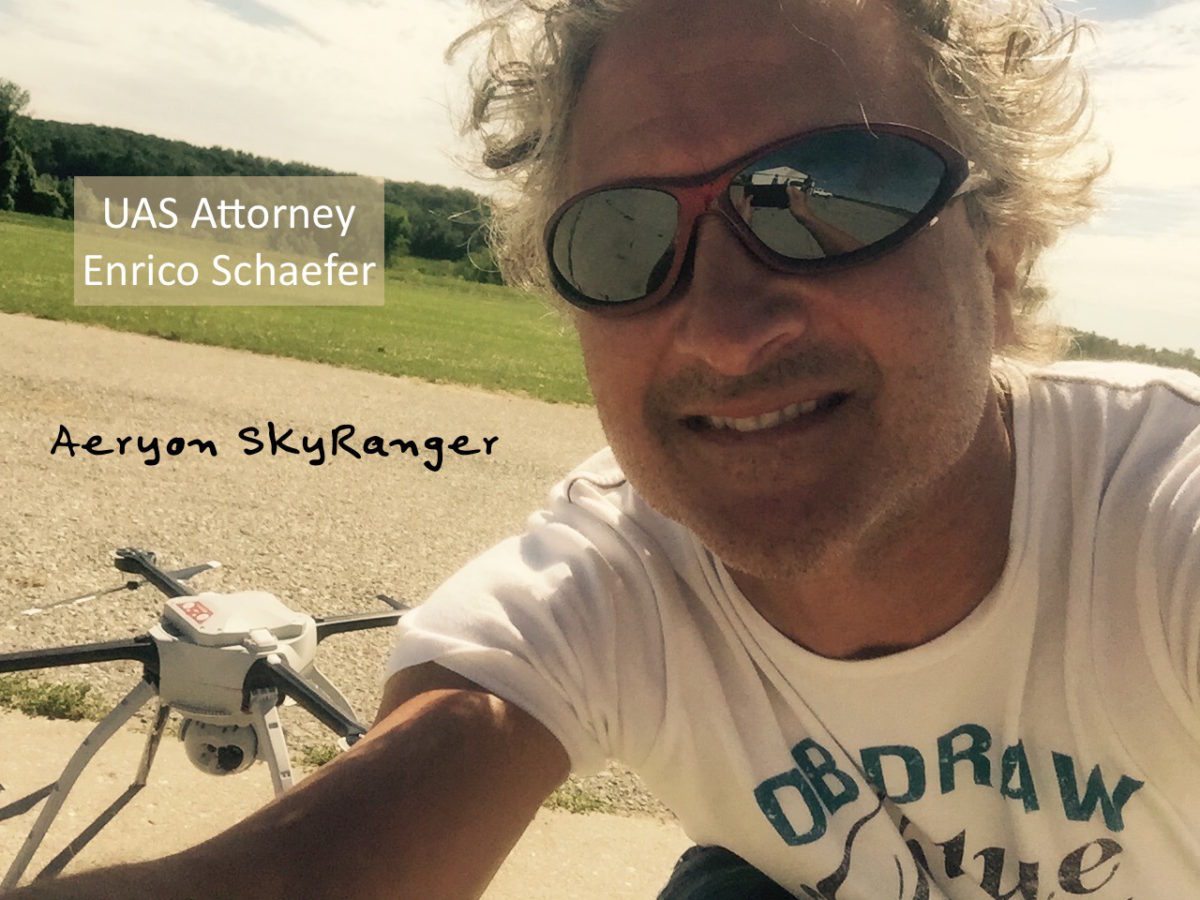There are drone pilots who complaint about part 107. And there are drone service providers who embrace the part 107 regulations. Beyond part 107, there are groups working on industry standards that are more exacting than what is required by Part 107. Embracing industry standards for sUAS operations beyond part 107 is important. Creating professionalism in the industry will help with market development, consumer demand and pricing for services which reflect professional operations.
In this podcast, drone attorney Enrico Schaefer discusses the importance of industry standards for sUAS in the United States.
LISTEN TO THE PODCAST BELOW – SUBSCRIBE TO
This is Drone attorney Enrico Schaefer. Today we are going to be talking about industry standards for unmanned aerial vehicles – UAV.
Part 107 has a regulatory frame work that hopefully everyone is working within. The fly by night people are certainly going to be a problem for some time, but as we move towards professionalism we are all going to benefit. For Drone Pilots and Drone Service Providers and for enterprises looking to integrate Drones into your business service offerings to your clients and customers.
What is it that we are needing to see happen next? One of the things we need to see is a set of industry standards that are actually more restrictive than Part 107. We need to continue to develop the industry of sUAS as a professional service industry like doctors, lawyers, and manned aircraft pilot. Until customers see Drone services as a professional service industry, where they are wanting to hire only professionals, we are going to have a problem with pricing. The problem with pricing is that customers do not understand the value proposition yet. Customers do not understand the value proposition yet. Customers do not understand why they should pay a given amount for the services provided for the flight time and licensing of the Copyrights that are generated by the Drone flight, because they haven’t been through it before.
The other problem is that the professional service providers, who are compliant with Part 107 are competing against service providers who are not professional who are fly by night who are part time who are dabbling in the industry the kid next door who bought a Drone. The kid next door who bought a Drone is not charging much. Why should I hire you? The kid next door is only going to charge me a fraction of what you are providing. You as a Drone service provider and Drone Pilot need to be able to answer that question. The answer is simple. You do not want to hire the kid next door – Mr. and Mrs. Customer. The kid next door does not have insurance, business operations, professional grade customer service contract which you will be reviewing and signing.
The service contract is designed to protect you against any liability that may occur as a result of the Drone flight. Not only that, as we already know within the industry, the quality of the pictures and video that are being provided by customers is a large part dependent on the skill of the Drone Pilot and service provider.
What will industry standards do to help us along toward to being perceived as a professional service industry? Industry standards are going to be the type of thing that customers will eventually understand that exist. Customers will look for in terms of hiring and we will feel comfortable with Drone Pilots and service providers who comply with these industry standards. Insurance companies are going to begin, at one point, quoting you insurance based in part whether or not you are compliant with industry standards.
Whether or not if you have been certified by a certain particular standards organization and these types of things. We all want to embrace industry standards. Let me give you some examples of simple things that really are already becoming industry standards that do not “raise the bar” too much but are really important to safety and professionalism in the industry.
First certain types of operations the Drone Pilot should be providing notice to neighboring property owners. Under some instances and flight operations, getting permission of neighboring property owners before they fly the mission. It is not required by Part 107, yet it certainly something that many professional Drone Pilots are doing in many types of Drone operations. It is a great marketing activity when you go to the neighbor and you notify them that you are flying an operation on this date and here is our contact information and if you ever need Drone services here is our marketing information.
Another example of an industry standard, which will be coming down the pike as some point, you should be doing all Drone operations under an Operations Manual that is custom to your company. These Operation Manuals obviously are going to require compliance to Part 107. They are also going to spell out all of the internal procedures you have to make sure that Drone flights are operating in a standardized way consistent with your enterprise’s safety, documentation, and pilot qualifications guidelines. Having an Operations Manual that you can show a customer will help educate the customer about professionalism and creates a market barrier. You want that customer to the next competing Drone Pilot that walks through their door, “Hey Mister Drone Pilot where is your Operations Manual? Can I see it? Oh, you do not have an Operations Manual.”
You’ve already educated the customer that you have one, you’ve showed it to them and how the Operations Manual keeps them safe. Alright that’s my pitch for today on industry standards. I am Drone Attorney Enrico Schaefer. Until next time.

